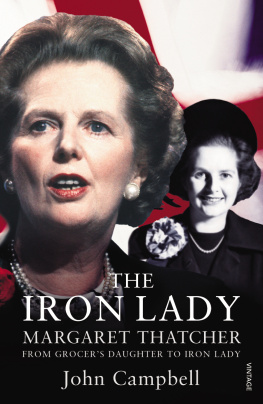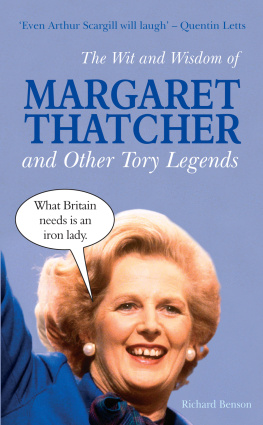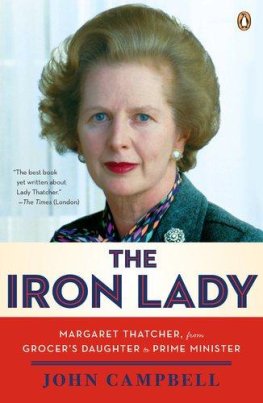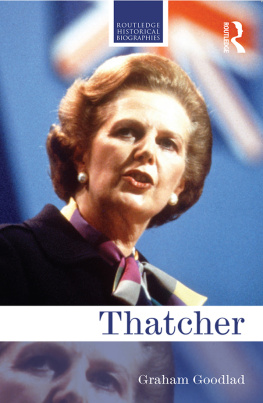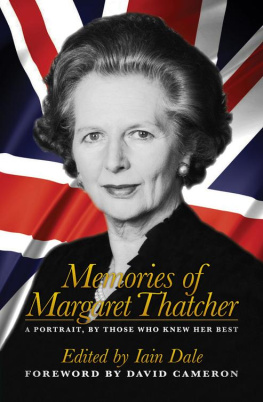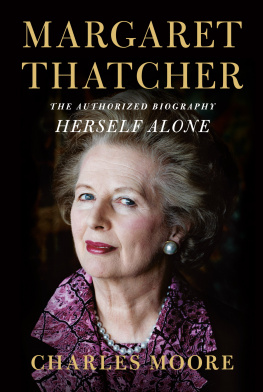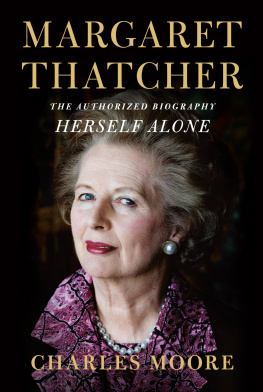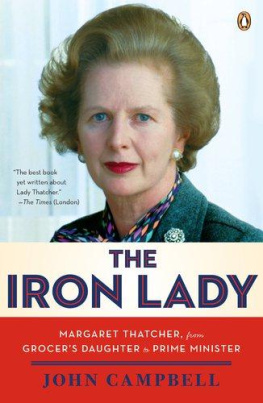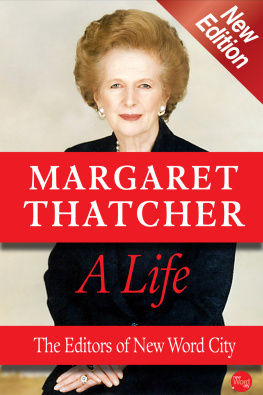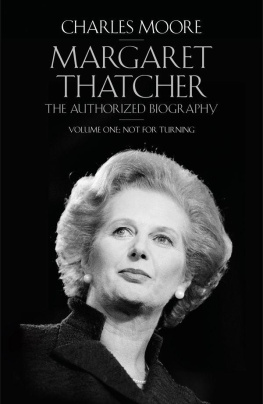Contents
About the Book
In this abridged edition of John Campbells two acclaimed volumes on Margaret Thatcher we trace the life of Britains only female Prime Minister, from her upbringing in Grantham to her unexpected challenge to Edward Heath for leadership of the Conservative party and her eventual removal from power. This is an extraordinary account of an extraordinary woman; John Campbell portrays an ambitious and determined woman who may have begun her career in office almost timidly but who became increasingly remote and arrogant after the Falklands, eventually losing the trust of her colleagues.
With a revised conclusion by the author
About the Author
John Campbell is one of the countrys leading political biographers. His books include Lloyd George: The Goat in the Wilderness, Edward Heath (for which he was awarded the NCR Award) and If Love Were All The Story of Frances Stevenson and David Lloyd George. His most recent book, Pistols at Dawn: Two Hundred Years of Political Rivalry from Pitt and Fox to Blair and Brown, was published in 2009 and he is currently writing the official biography of Roy Jenkins.
David Freeman is Lecturer in History at California State University, Fullerton. He earned his Ph.D. in modern British history and serves on the staff of Finest Hour, the journal of the Churchill Centre to which he has contributed articles about Churchill and the Invention of Iraq, Churchill and the Anglo-Irish Treaty and Churchill & De Valera. He is working on a book about Leo Amery and Imperial Preference.
ALSO BY JOHN CAMPBELL
Lloyd George: The Goat in the Wilderness
F. E. Smith: First Earl of Birkenhead
Roy Jenkins
Nye Bevan and the Mirage of British Socialism
Edward Heath
Margaret Thatcher Volume One: The Grocers Daughter
Margaret Thatcher Volume Two: The Iron Lady
If Love Were All The Story of Frances Stevenson and David Lloyd George
Pistols at Dawn: Two Hundred Years of Political Rivalry from Pitt and Fox to Blair and Brown
List of Illustrations
Alfred Roberts soon after his election as Councillor, 1927.
Margaret, aged four, and Muriel, aged eight, in 1929.
Alfred Roberts shop fallen on hard times after his retirement.
Denis and Margaret on their wedding day, December 1951.
Mother of twins, August 1953.
With Carol and Mark soon after her election to Parliament in 1959.
After her party conference speech, October 1976.
Labour Isnt Working, summer 1978.
Where there is discord, may we bring harmony.
Mrs Thatcher with her two long-serving Chancellors of the Exchequer, Geoffrey Howe ...
... and Nigel Lawson.
The Prime Minister, with Ian Gow, leaves 10 Downing Street to face the House of Commons following the Argentine invasion of the Falklands, 3 April 1982.
Mrs Thatchers farewell visit to Washington near the end of Ronald Reagans presidency, November 1988.
With Mikhail Gorbachev in Moscow, March 1987.
Mrs Thatchers farewell speech on leaving Downing Street, 28 November 1990.
Baroness Thatcher in the House of Lords before the State Opening of Parliament, June 2001.
CREDITS
The author and publishers are grateful to the following sources for permission to reproduce illustrations: Camera Press, images 2, 3, 4, 5, 14, 15; Topham Picturepoint, image 6; PA News, images 7, 9; Hulton Getty, image 8; Rex Features, images 10, 13, 16; PA Photos, images 11, 12. They would also like to thank the Local Studies Collection, Grantham Library, Lincolnshire County Council Education and Cultural Services Directorate for image 1.
For Robin and Paddy two of Thatchers children
JOHN CAMPBELL
The Iron Lady
Margaret Thatcher:
From Grocers Daughter
to Iron Lady
ABRIDGEMENT BY
David Freeman
1
Dutiful Daughter
Grantham born
A FORMER TOWN clerk once described Grantham as a narrow town, built on a narrow street and inhabited by narrow people. Yet Grantham was once more than this. Look closer and it is a palimpsest of English history. Incorporated in 1463, it was a medieval market town. Kings stopped there on their journeys north: Richard III signed Buckinghams death warrant in the Angel Hotel. St Wulframs church boasts one of the tallest spires in England. Englands greatest scientist, Isaac Newton, was born seven miles south of the town in 1642 and educated at the grammar school.
Beatrice Stephenson Margaret Thatchers mother was Grantham born and bred. She was born on 24 August 1888. Her father, Daniel Stephenson, is euphemistically described as a railway-man: he was actually for thirty-five years a cloakroom attendant. He married, in 1876, Phoebe Crust, described as a farmers daughter (which might mean anything) from the village of Fishtoft Fen, near Boston, who had found work in Grantham as a factory machinist. Beatrice, one of several children, lived at home in South Parade until she was twenty-eight, working as a seamstress. Her daughter says she had her own business; but whether she worked alone or employed other girls there is no record. In December 1916 Daniel died. Five months later, on 28 May 1917, Beatrice married an ambitious young shop assistant four years younger than herself whom she had met at chapel: Alfred Roberts.
He was not a Grantham man, but was born at Ringstead, near Oundle in Northamptonshire, on 18 April 1892, the eldest of seven children of Benjamin Roberts and Ellen Smith. The Roberts side of his family came originally from Wales but had been settled in Northamptonshire as boot and shoe manufacturers for four generations. Alfred broke away from shoemaking. A bookish boy, he would have liked to train to be a teacher, but was forced to leave school at twelve to supplement the family income. He spent the rest of his life reading determinedly to make up for the education he had missed. He went into the grocery trade and after a number of odd jobs over the next ten years came to Grantham in 1913 to take up a position as an assistant manager with Cliffords on London Road. It was while working for Alderman Clifford that he met Beatrice Stephenson. They are said to have met in chapel; but she may well have been a customer as well. However they met, Alfred soon began a lengthy courtship.
As a young man born in 1892 Alf was lucky to survive the Great War. He was tall, upright and good looking, but seriously short sighted. All his life he wore thick pebble glasses. He tried to enlist, but was rejected on the grounds of defective eyesight. Spared the fate of so many of his contemporaries, he was free to pursue his chosen trade. He worked hard and saved hard, and by 1917 he and Beatrice he called her Beatie had saved enough to marry. At first Alf moved in with Beatie and her mother, but within two years they were able, with a mortgage, to buy their own small shop at the other end of town in North Parade. Phoebe came to live with them over the shop. Their first child, christened Muriel, was born in May 1921. Their second, another daughter, did not come for another four years, by which time Beatrice was thirty-seven. Margaret Hilda Roberts the choice of names has never been explained was born over the shop on 13 October 1925.
The shop was a general store and also a post office. This is something which the iconography of Thatcherism tends to overlook; yet it subtly changes the picture of Alfred as the archetypal small businessman and champion of private enterprise. He was that; but as a sub-postmaster he was also an agent of central government, a sort of minor civil servant. The post office franchise was an important part of his business. The Post Office Savings Bank was the only bank most people knew; and old-age pensions had been paid through the post office since their introduction in 1908. The elderly of north Grantham collected their weekly ten shillings from North Parade. To this extent Alfred even in the 1920s and much more so after 1945 was an agent of the nascent welfare state; and Margaret was brought up with first-hand knowledge of its delivery system.

